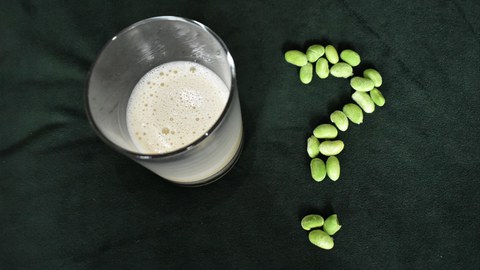Dec 31, 2022
Let’s Talk About Soy, Baby! – Soy and Male Fertility

The science behind the dangerous myth that soy consumption influences masculinity.
Soy boy - an insult towards young men who are not living up to the traditional idea of masculinity. Their lifestyle is often associated with reduced meat consumption and the stereotype of increased soy intake. Soy boy is meant to imply softness and effeminacy, as a consequence of soy consumption. This term is one of the favourites in the tool box of right wing conservatives , to deplore people with different lifestyles than their own. Soy, an increasingly important crop in everyone’s diet, is consumed by humans either indirectly through animal products, since the vast majority of cultivated soy is fed to livestock, or directly through soy products such as tofu, soy milk or soy beans.
But why do people assume soy intake could be linked to masculinity?
Does soy consumption really have an effect on masculinity or more specifically on male fertility? Some theory behind the urban myth: Soy contains molecules, so called phytoestrogens, that have a similar structure to the human hormone estrogen. Since estrogen levels in men are generally lower than in women, the intake of phytoestrogens is suggested to have a feminizing effect on men. Phytoestrogens can interact with the hormone binding site in the cell, but figuratively, the soy puzzle piece does not fit as well as the original piece and therefore does not trigger the same reactions as the human hormone. However, the exact mode of function is still being researched.
Fertility is not sufficiently represented by just one meaningful indicator but reduced chances of pregnancy can be linked to some sperm parameters. Sperm number, morphology or motility are often assessed in case of male inability to conceive children. The idea that soy affects male fertility mainly comes from animal studies. However, these concern rodents, which are not exactly like humans.
Also, even most of the animal studies did not find an indication for decreased fertility. And even within rodents, the results in mice and rats were different. So it seems animals studies in this case have a low relevance to humans. In humans, the majority of studies did not find that more soy consumption reduces reproductive health, even though a few individual studies did report weak effects on one of several sperm parameters.
To summarise, scientific studies on the effect of soy in animals may poorly apply to humans and studies in humans hardly show any effect. Currently, therefore, a solid conclusion would be that soy - an important part of a healthy and balanced diet and one that is needed to respect our planet's limit - can be consumed without fearing effects for one´s masculinity or indeed male fertility. Fragile masculinity, based on the contempt for dietary choices surrounding different lifestyles, needs to be questioned rather than the effects of soy. Newspaper and online articles should be read with caution in regard to their conclusions on scientific studies.
Issue 2
Emma Markwardt, Helen Rothfuß, Nele Kheim
